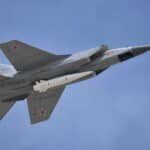A U.S.-Russian missile defense cooperative?
By Pavel Podvig | April 23, 2007
Oddly enough, the U.S.-Russian row over missile defense is exactly what needed to happen for the two countries to start talking again.
After a series of questions from its European allies, a number of strongly worded statements
from Russian politicians, and a telephone conversation between Vladimir Putin and George W. Bush,
the United States finally admitted it blundered by going ahead with plans to deploy elements of its
missile defense system in Europe without asking anyone. Now, the United States is launching a
coordinated effort to explain the deployment’s rationale and even suggesting that Russia and the
United States share missile defense technology and coordinate ballistic missile threat
assessments.
Of course, none of this makes missile defense a good idea. But these steps could help tone down
Russian rhetoric. While both the United States and Russia seem serious about not starting a new
Cold War, the frequency with which they’re issuing denials of hostile intentions is growing
alarming. If everything was okay, nobody would need all the extra reassurances.
Nor will a U.S.-Russian dialogue about missile defense end the controversy. The United States
insists it won’t allow Russia to veto the deployment, and Russian leadership is openly skeptical
about the justification for U.S. interceptors and radars in Europe. Still, a conversation is better
than back-and-forth promises of missile deployments or Russia’s threat to withdraw from the
Intermediate Nuclear Forces Treaty.
The biggest problem with the current predicament is that it gives Russia yet another reason to
believe that unless it makes credible threats, preferably ones that involve nuclear weapons and
missiles, no one–not the United States or (old or new) Europe–will listen. This is regrettable
since the security discussion in Russia is already heavily dominated by the Cold War concepts of
“strategic balance” and a bean-counting mentality that places an emphasis on the number of weapons
in Russia’s arsenal. The outcome of the missile defense flap only reinforces these beliefs, doing
all parties involved a disservice–most notably Russia.
Moreover, none of this needed to happen. Russia has tried to insert itself in the discussion
about U.S. missile defense installations in Europe for the better part of a decade. Moscow even
suggested engaging in a similar cooperative agreement to the one that’s on the table
today–consultations about ballistic missile threats and collaborations on technology development.
Nothing materialized because the U.S. missile defense bureaucracy understandably perceived these
proposals as a threat to its programs.
For all of the Bush administration’s faults, it at least got one thing right: The Cold War is
over; therefore, its concepts and strategies are outdated. But it erred in thinking that this means
that all of the problems that Washington and Moscow inherited from the Cold War would simply
disappear. This proved to be wrong–changing the Cold War mentality requires a dedicated effort on
both sides. Instead, the United States and Russia rolled back most of the cooperative programs that
existed in the 1990s. Bringing them back now would be a very difficult task.
So even though missile defense is hardly a worthy area for cooperation, we should welcome this
development if it means Moscow and Washington start talking again.
Together, we make the world safer.
The Bulletin elevates expert voices above the noise. But as an independent nonprofit organization, our operations depend on the support of readers like you. Help us continue to deliver quality journalism that holds leaders accountable. Your support of our work at any level is important. In return, we promise our coverage will be understandable, influential, vigilant, solution-oriented, and fair-minded. Together we can make a difference.
Topics: Columnists, Missile Defense















